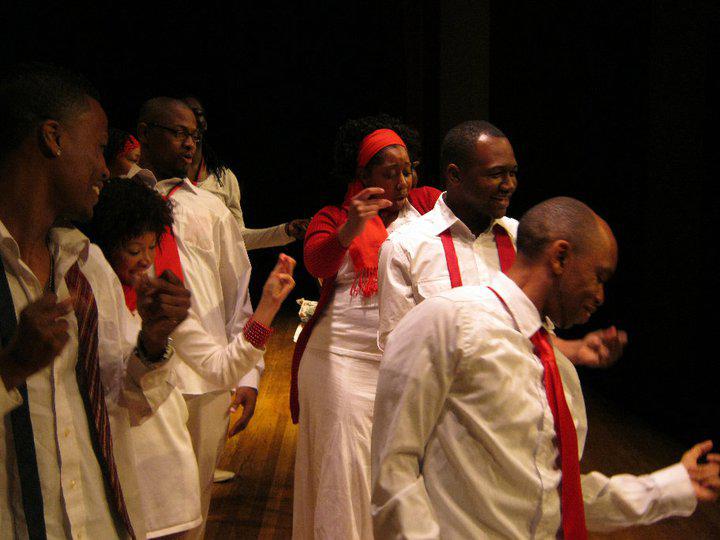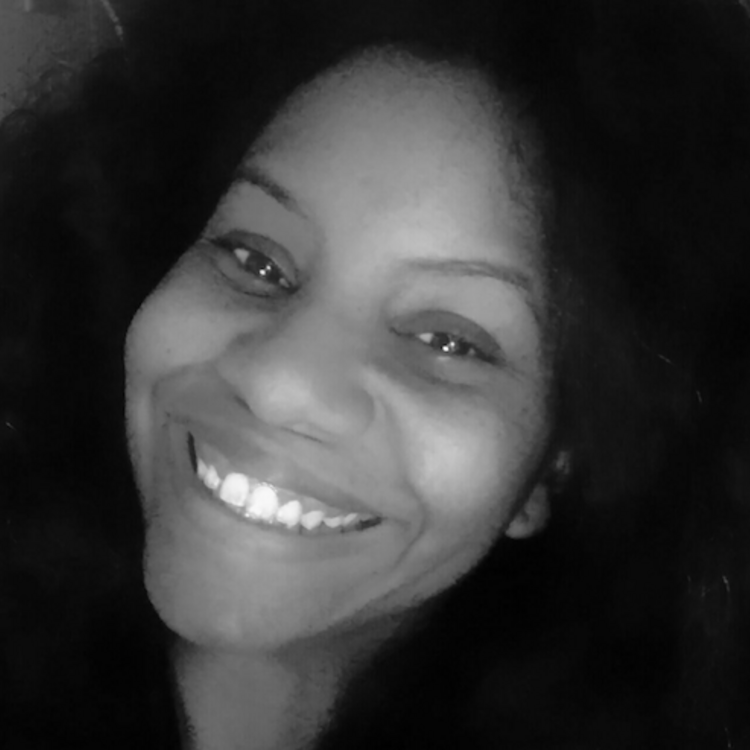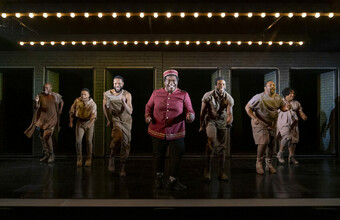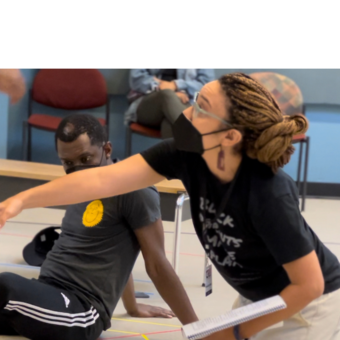How to Survive Predominately White Academic Theatre
Cause a Disruptive Innovation

But someday somebody'll
Stand up and talk about me,
And write about me—
Black and beautiful—
And sing about me,
And put on plays about me!
I reckon it'll be
Me myself!Yes, it'll be me.
—Langston Hughes, Note on Commercial Theatre
Maya Angelou once wrote, “You may not control all the events that happen to you, but you can decide not to be reduced by them.” It is that unfeigned self-reduction that has led me to this turning point in my life. After seven years of being on tenure-track in the field of theatre and playwriting, a personal metamorphosis is leading me away from academia and back to my true passion.
I remember being twenty-six and starting out on tenure-track when an African-American professor/mentor recommended a book that would help me withstand and fight the institutional racism I was about to experience as a black female faculty member in academia.
I joined support groups made up of women of color who were navigating these systems. These support systems are real. Black women are coming together to validate one another, share opportunities, and be heroic with their motivational timing.
I can recall going online to buy this book and seeing various other texts in the recommended reading column. From the online bookstore I took to the Internet where many articles came up addressing systemic racial issues at predominantly white institutions—providing advice on how to “survive” it all. I joined support groups made up of women of color who were navigating these systems while sharing pearls of wisdom and stories of survival. These support systems are real. Black women are coming together to validate one another, share opportunities, and be heroic with their motivational timing. These books, articles, conference presentations, and focus groups are necessary for the same reason black graduate student organizations exist. We need these communities of support for retention purposes and dream realization. The interesting thing about retention of minorities in predominantly white institutions is that it typically centers on keeping faculty and students of color happy so that they can physically remain on their campuses. I still don’t know if it’s all genuine or not. Black faculty and student retention in the arts is unique in that the aesthetics of personhood are so important. All in all, the struggle is real.
In truth, I have always grappled with seeing myself as a traditional academic. Many theatre faculty artists with MFAs struggle with this feeling. The artistic compromise one often feels when researching and producing scholarship is not where I, as a tenure-track professor, felt most conflicted. I wish that were the basic fundamental struggle. From well-intentioned colleagues casting African-American students in stereotyped roles and in roles that were unequivocally Eurocentric to strategizing mainstage season lineups that did not include African-American playwrights (i.e., stories about black people for other black people), the largest obstacle was the level of resistance to provide a safe space for black student artists to grow into their own authenticity through theatre.
Since being on tenure-track, cultivating resilience as a minority and being an unofficial diversity officer has been the nature of the job. White people’s need of me to help them understand my culture, my aesthetic, i.e., myself, was flattering for a while, I admit. It even got me believing that maybe I was “at home.” Was I “at home” because white people needed me for their own survival and vibrancy? Was being a minority and a diversity champion my assigned territory?
When I ask myself how did I get here? How did I find my way into a profession where I am constantly finding ways to survive? How did I, an HBCU graduate, end up in a workspace where there is such resistance to having serious conversations about diversity and inclusion? Where there is exclusion of one’s experience and survival is nearly impossible because you—because I—essentially don’t count, I ask myself again, is this how being “at home” is supposed to feel?
As an assistant professor, I wrote season selection proposals that intentionally called for more than what met the departmental eye in terms of black actors. Most of these proposals never stood a chance because of the status quo, but I submitted them anyway, emphasizing “recruitment opportunity.” I thought about boycotting seasons that did not include the black experience, but hesitated for fear of not being collegial. Maya Angelou also expressed how a significant event in her life caused her to stop talking for several years. She chose to become mute, and when she was ready, she spoke. For years, I too, lost my voice. I allowed racial inequities to reduce me to silence. Now, I must speak. I must ask questions. Why is there such an obvious exclusion of the black perspective in academic theatre? What institutional policies and procedures are producing bodies fashioning themselves after and are those standards enforcing cultural awareness on stage, in audiences, in theatre classrooms, and in production labs? Why is the focus of white faculty mentorship positioning assistant professors for success while mentorship for black faculty centers on retention?
To teach also means to mentor. As mentors, we have to know that asking a black student in a costuming class to build KKK hoods for a theatrical comedy is crushing and constitutes symbolic death. We have to know that even when we issue trigger warnings, even when we ask "are you sure you can do this assignment?” and even if the student’s reply is "yes," that there is more to it. It’s deeper than the yes and the student doesn't want attention drawn to their pain or anger.
We acknowledge that students don’t have enough life experience to understand the depth of certain human emotion; yet we believe that a black student is strong enough to work under circumstances that remind them of our country’s history of race hatred and violence? Sometimes trigger warnings work and sometimes they simply do not.
Color conscious casting at predominately white institutions often provide opportunities for students to play opposite white protagonists and in roles that allow them to borrow from their cultural identity rather than fully embrace their historical and cultural identity. We never talk about what this costs a black student or a black audience member who is on the receiving end of such a missed opportunity.
I have worked with a few well-intentioned white theatre faculty members who try very hard to be inclusive. I have talked with many who believe they are trying. I also know some who have not tried since the last time when it didn't work out. So they wait on black students to show up to audition so they can get plugged in to ensemble roles. Black theatre students are just like their white counterparts in that they will take any opportunity to advance to the next big opportunity and grapple with what it cost them later on. Black students, however, are the only ones who will be cast in roles that were written for whites. What hurts is watching them take pride in the fact that their acting skills superseded their authenticity and a role created for them in a story about them. They, too, need survival methods.
It was in January of 2016 that I finally got it. I was trying to force a disruptive innovation in diversity and inclusion with a community of creative scholars who have their own agendas; and I was outnumbered. My tenure track trajectory has been about fighting for change, fighting for diversity and inclusion as it impacts African-American students, myself as a black faculty member and conscious audience members. Whether passive or active, racism in academic theatre is equivalent to what we see in commercial theatre and it typically manifests in the exclusion of the black perspective or the erasure of the black body (presence). Perhaps wanting to see black students and black audiences take precedence was magical thinking, but it helped me to understand that I do feel a sense of loyalty to the African-American community. Universality and the human condition is often the default in American theatre, but for a black storyteller, that default encourages self-reduction.
Creative people spend a significant amount of time thinking about large ideas, chasing dreams, enlightening others, fighting for justice, achieving artistic autonomy, and trying to survive. I’ve dedicated time to all of these. At this point, I just want to quiet my mind and hear what I am really being called to do and what it means to be “at home.” Perhaps it involves educating, but being able to teach freely and not wonder about biases in student evaluations. I think it means being able to be myself and not wonder whether or not I will lose collegiality points or make people uncomfortable.
I believe the new minority in academic theatre is he or she who understands that systemic racism is alive in our field and refuses to subscribe to practices that do not bring about radical changes in their student recruitment, faculty hiring, season selection processes, audiences, and production protocols.
I believe the new minority in academic theatre is he or she who acknowledges and affirms self first. He or she understands that systemic racism is alive in our field and refuses to subscribe to practices that do not bring about radical changes in their student recruitment, faculty hiring, season selection processes, audiences, and production protocols. This is disruptive innovation. This is radical and necessary. I would love to be the one who continued to fight for change, causing one disruptive innovation after another on my way to promotion and tenure. But at what cost? How vibrant will I be after the endeavor?
After seven years of being on tenure-track in the field of theatre and playwriting, I am causing a disruptive innovation. I am walking away from predominantly white academic theatre to re-access what is truly important. I am finding that the pursuit of tenure has diverted me from what comes naturally to me. My passion is for black theatre and to create theatre on my own terms. I am reconnecting with the teaching artist I used to be: spiritually led, unbreakable, and more importantly, honest. Finally, I’m home.










Comments
The article is just the start of the conversation—we want to know what you think about this subject, too! HowlRound is a space for knowledge-sharing, and we welcome spirited, thoughtful, and on-topic dialogue. Find our full comments policy here
Thank you so much for writing this. As a rising sophomore who plans to major in Theatre, I, being a Black American young man, am not only very passionate about Justice, but in using the arts to tell stories related to my (and my People's experiences) and call attention to issues. I always wanted to be an artist, but I grew up telling myself I couldn't truly be one, as it was associated with "White culture." Just that fact that young kids of color, whether interested in being creators are not, are probably growing up choosing to not engage with institutions like Theatre because of White Hegemony is a big problem. And in my limited time working in Theatre, I've not seen many places make a concerted effort to break down that issue, and make Theatre more equitable. I wish it were so. A part of me holds some trepidation about continuing in the Theatre major at my school because of the ways in which from my experience so far courses seem to focus so much on White-European male stories. I'm glad you've put this out there, and are make "radical" steps. We need more Radicals and Revolutionaries out there. Many artists love to claim that being an artist automatically makes you important and a force to reckon with when it comes to systems of power, and yet aren't using their art, or pushing the artforms to speak truth to power and concede power to the voiceless. That needs to change. I want to help that change as well.
Hi @kavondwilson:disqus, I've been exactly where you are. I remember thinking it wasn't for me or there had to be another way. I grew to understand that it WAS for me to have (the degree in the field I was most passionate about) and there certainly was another way of functioning in the field without losing my sense of Self. Operative word: GREW [to understand]. From the angle of a student, it was hard and felt costly almost all of the time. Be the change you want to see. Be the artist you want to be. Leave a rich legacy at your school and in your community, which I can tell you are doing. Go through these essential academic steps, keeping Self in tact, and there will be a new found freedom waiting for you at the end of the tunnel. FYI- https://www.amazon.com/Catc...
Thank you! And not just what is the story and who are the characters, but how is the story told? There are many different forms that we can use, not just the Aristotelean/Ibsonian; we can reexamine the relationship between performers and audience in a way that draws from different sources of story telling and group communication. I've had thirty years on stage, and I still struggle with the idea of womanhood I'm often asked to portray. Doesn't fit my paradigm. When you do it enough times, it can silence your voice. Have a wonderful time at the boarding school! I bet there are ghost stories on campus and alternative spaces waiting for you...
@Anglojen:disqus, yes. And yes. I am a contributing author in a book coming out this fall called BLACK ACTING METHODS and we have approaches for re-examining all of "it"- https://www.amazon.com/Blac.... Thank you for the positive energy.
Clinnesha, I intimately identify with what you expressed in your article. I experienced the same feelings as a tenure-track professor in a business school and I must say that the struggle is real across all disciplines on predominantly white college campuses. Inequity exists on all levels of education and the profession. I see it when African-American directors and choreographers are passed over for opportunities to direct and choreograph African-American work (or work that needs an awareness of our culture and traditions) for non-African Americans who are not steeped in the nuances of our culture. I see it when African-American directors and choreographers are passed over for other opportunities as if the only work we can do is by African Americans, as if our training is culturally specific. It is ironic that for non-Blacks, cultural specificity is never a "challenge" to overcome. It is a triumph when a Black person can play a non-Black role, but it is just par for the course when an entire cast of non-blacks performs a Black show. (I see this particularly frequently on the secondary education level and it is clear that the students do not get much, if any, historical or culturally relevant information in their production process.). Yes, there is still a LOT of work to be done. And we are fighting with you on many educational and professional levels. Thank you for sharing.
Thank you for emphasizing other fields that face these challenges. And yes there is a lot of work to be done and so many nuances. Secondary ed is actually my new impact area. I know there will be challenges on that level as well. Many challenges are ahead I am sure, but like Pearl Cleage mentioned earlier, when you find that "artistic home", you find a great thing.
Chiming in as a straight white guy ally in support of this beautiful article.
One word that I've learned to focus on, especially from some industry wide discussion and training here in nyc, the word equity. You definitely get to it at the end, but don't necessarily identify it and I think its important to call it our clearly because of some of the problems you discuss earlier in the article.
I think the words diversity, and inclusion, mislead lots of uneducated, inexperienced people, who live in mostly white worlds, to be think and believe (mostly out of the goodness of their misinformed hearts) that diversity and inclusion are satisfied by token castings, an occasional playwright of color or lgbtq orientation...
But the real deal is when you talk about recruitment and audience. Building equity means just that. Finding opportunity for people of color to even know that being an artist can be an option, and then empowering them to engage. if there are no people of color in the collegiate audience from the nearby community...and there is no equitable outreach (which means a deeper outreach than blanket outreach that suffices for privileged white communities) then there is no way to change this problem as the lone faculty member of color...
It then results in industry wide tokenism and not enough opportunity to create equity. Professionally we can't just cast the designer recently graduated from yale and claim equity...we need better audience development, and furthermore on a deeper level, more equitable funding in schools at the elementary school level in communities of color, to ensure arts as part of the real world. Then we need to significantly increase cultural funding and more equitable philanthropic practices...which there are small movements in but not ones that are creating equity any time soon.
That said, I do realize I've carried on as a white person in this discussion, but I am immersed in this conversation and wanted to try to empower the folks reading the comments, towards the solutions, because in the advocacy community, we need more and more engagement from people of color, and it's a very hard thing to make happen without allies of color ensuring that we don't simply extend our power into communities of color, but rather bring people into these discussions to change the power dynamics.
Brad Burgess
Artistic Director
The Living Theatre
Indie Theater Fund
League of Independent Theaters
Hello! And thank you for responding. I also believe that something innovative has to happen at a pre-college level in order to develop students (future theatre arts majors/playwrights) and their families/loved ones (future audience members). A predominantly African-American boarding school is where I am now directing my focus (as a performing arts teacher). This particular school was founded in 1910 for poor black people in the segregated South. It continues to produce college-bound students, a remarkable achievement considering its location in rural Mississippi, the struggle for aid, and the general substandard conditions of many schools that serve African-Americans in Mississippi and across the country. I am going to do work there for some of the exact reasons you’ve mentioned. I believe it is a solution! I do, however, believe this solution gives power to the notion that “black people do not go to the theatre”. After experiencing a lot of commercial, regional and academic theatre, my thought tends to be: “black people do not have a reason to go to the theatre.” And the greater question in my opinion is, “What is theatre? What experience are we creating for the public and for our own artistic growth?” Most people are inclined to go where they feel they are at home. There are certain theatres that feel like "home" to me and there are many theatres that simply do not. I agree with your sentiments about diversity and inclusion, and I remain fascinated by the intense level of strategic thinking it requires to realize it. I hope that more people who are in positions of power will discuss, innovate and implement. Your insight is deeply appreciated @birdsyLT:disqus.
Wow. Thank you, Brad. And, hello again. I believe we've engaged at the All Stars Project. It's nice to hear from you again. Yes, I believe "equity" is a good word to use, because it, for me, draws upon the idea of a concerted effort to undo the historical/contemporary damage which creates this marginalization int the theatre altogether.
Awesome to find you on here! Great speech on saturday and thanks for the training these past weeks. How did you hear about Howlround?
Thanks!!! It was great working with you. Have you heard of Epic Theatre Ensemble? I have been with them for a number of years. They shared this article on Facebook, and so I read it.
Getting ready to join an academic program on a tenure track in arts administration. I'm book marking this article for discussion with my students and my colleagues. Thank you for your passion and your work. I really hope we can make things different for future students and teachers.
@rebeccabowmanbromels:disqus that is my hope, too. Thank you. All the best to you on your journey to tenure and finding your home.
This is so important. Thank you for sharing your experience and courage with us.
@emilyaguilarthomas:disqus I can't thank you enough for hearing it.
As a mixed kid who is currently halfway through their B.A. in theatre...there are SO MANY things in this article I can relate to. It can be really difficult. Conversation with the faculty about these massive problems in academic theatre aren't always welcomed. Especially not from the students perspective. Thank you for sharing.
@joebahena:disqus thank you for responding. You students have more power than you know.
Clinnesha, I appreciate your words and perspective. I live and work out of Raymond, Mississippi but am working in the arts across the country. I would love to learn more about your work and find ways to build on this important conversation, especially in the south.
@carlton_turner:disqus, thank you for reaching out. I'd like to connect as well. I am now based in Florence, Mississippi and my plays/creative writing bring attention to the south. Let's get to work!
This made me sad for those struggling within places where they do not see reflected the truth of their own lives and the life of our country as it really is right now! I affirm the validity of their struggles and on behalf of artists seeking truth I offer thanks for their willingness to struggle and absolute respect for the decision to step away and find a more welcoming artistic home. Maya also said"when somebody shows you who they are, believe them ... The first time."
Finding "a more welcoming artistic home". Yes. "When somebody shows you who they are". Yes. I have so much respect for you and I am honored that you read my article. ❤
This, this, THIS! As a fellow terminal graduate degree holder in the Humanities I cannot like this article enough! She lays out everything that is wrong with academic theatre. It is training young black artists to shoot for ensemble roles in theatre because they will never be the star. How can they when the protagonists are always white in the majority of plays?!! It also trains them to see their race as a problem to be transcended or dealt with, instead of something amazing to be embraced and celebrated. There is so much more I could say about this wonderful piece.
@billyflood:disqus, I thank you. The contributions made by African-American playwrights are brilliant, evocative and so relevant. Wonderful stories that allow us to stage real diversity through the lived realities of black people never even make it to the table. It's unfortunate that many MFA candidates do not experience these plays in grad school/have them in their repertoire. Undergrad performers, directors, artists included. I'm so glad you mentioned "training"-- another area of focus that can be a hindrance for someone who is preeminently black.
Of course there are decades of amazing black artists creating great plays. That isn't the question. The issue is that BFA and MFA artists are being trained to work on Broadway and or regional theatre. Systemic issues prevent us working in large numbers-your LORT theatres aren't doing Pearl Cleague and Suzan Lori Parks as often as they do Eugene O Neil and Arthur Miller. So the professional union work opportunities for Actors of color are already limited.
This really nails it. I'm not black, rather half Indian, and in the same program I was expected to play culturally white roles as I was lauded for being "versatile". That felt... off. As though I was being asked to capitulate. I understood this was the norm in the field, but I felt there was an opportunity to disrupt that normalcy. The opportunity never came. Even when I played Persons of Color, it was opposite a body of white people also playing Persons of Color. Admittedly, I had a huge chip on my shoulder about this and had very little understanding of what could be done to address this issue. I was, to put it simply, angered. I hope academic theatre will seek more disruptive solutions to this issue.
@derekkolluri:disqus, I have radical empathy for you and all persons of color who share this experience. Thank you for being transparent. I really believe that transparency is key when it comes to making genuine, tangible change. I'm still learning, still growing, and definitely ready to be the change. All my love and appreciation.
So well said, Clinnesha. Fantastic read. Things I remember from academia: "We've tried doing AA shows before. It didn't work out." "I won't put a show on the list with a character that only one actor in the program can play." "I want you to sound more like Mammie." "I don't know why he was such a pain in the ass. Glad he left. I get that it's frustrating, but it's not like we weren't casting him."
Wow.